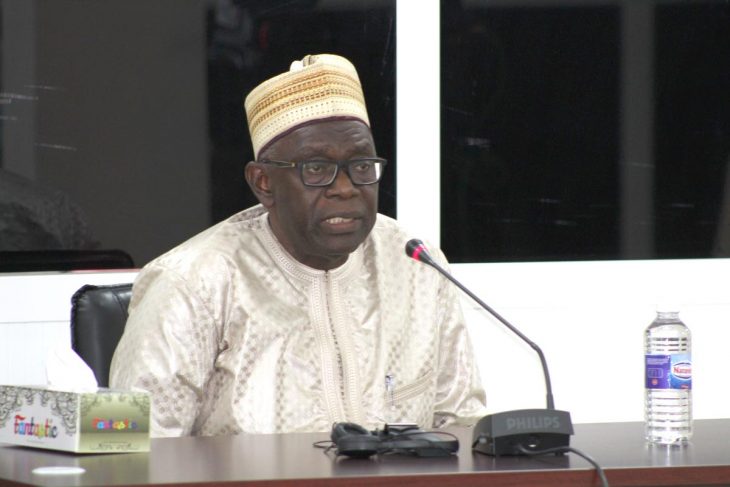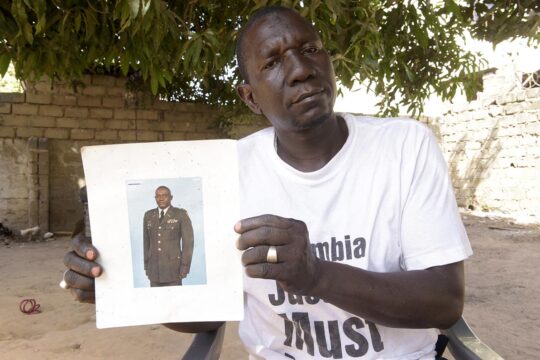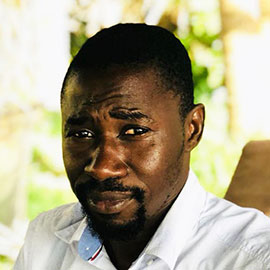In December 2013, Gambia’s opposition figure Amadou Sanneh appeared on television in an unusual circumstance. He was apparently confessing to the following crime: helping one Malang Fatty with an affidavit that suggested he was a member of the United Democratic Party (UDP), an opposition party, whose life was threatened in the country.
Sanneh was then a treasurer of the UDP who was tipped as being in line for the party’s leadership succession. For President Yahya Jammeh and his security apparatus this was a crime for which Sanneh should face serious consequences. It was also an opportunity to eliminate a strong political opponent.
Being in the political opposition under Jammeh was practically criminalized. It certainly meant you wouldn’t appear on national television. During the 22 years Jammeh ruled Gambia with an iron fist, from July 1994 to January 2017, political opponents, human rights defenders and journalists fled the country for the safety of their lives.
A “media trial”
After his arrest, Sanneh had been taken to the National Intelligence Agency (NIA) with two of his colleagues, Malang Fatty and Sambou Fatty (not related). Both Sanneh and Sambou Fatty were accused to have helped Malang Fatty with the affidavit that claimed his life was in danger. “They asked me to come on television and apologize to Yahya Jammeh,” testified Sanneh before the Truth, Reconciliation and Reparations Commission (TRRC) on June 11. He told the NIA he was not going to do that. He was then taken before a panel of NIA officials, led by their director at the time, Yankuaba Badgie, who is today standing trial for the murder of another UDP supporter, Ebrima Solo Sandeng, in 2016.
Despite the beatings, Sanneh would not give in. And yet here he was on Gambia Radio and Television Services (GRTS). His “media trial”, as it has been known in the Gambia, was relayed to him by his wife after his release in January of 2017, after Jammeh had fled to Equatorial Guinea and Adama Barrow took over as the democratically elected president of the Gambia. Since his release, Sanneh had never wanted to view the video of his broadcast because he wanted to forget it.
The video was played to him for the first time at the TRRC.
The room went cold. Sanneh peeked at the video as it was being played for him and shook his head. He appeared uncomfortable, adjusted himself in his sitting position and glanced at
the small crowd where his family sat. Then he looked down again. Both him and his party leader Ousainou Darboe, who was present among the public, had spatters of tears in their eyes.
“I did not recollect my appearances on GRTS. I was unconscious. I never remembered giving an interview to GRTS,” Sanneh said after he saw the video.
Conversations with Yahya Jammeh
Alongside Malang Fatty and Sambou Fatty, Sanneh was convicted on charges of conspiracy to commit an act with seditious intention, sedition, possession of seditious publication and false swearing. All three were sentenced to 5 years in jail. Sanneh had been arrested several times prior to that as a member of the United Democratic Party and in some occasions he reportedly suffered gruesome torture. His most recent torture, in 2013, left his spinal column partially displaced, he said.
Sanneh was a professional accountant who resigned from government after holding the positions of accountant general and permanent secretary at the Trade Ministry. As the government’s chief accountant, Sanneh had met Jammeh in the early days after the 1994 coup. “When they first came in, they had no respect for procedures or processes. Working in government for so many years, I know systems are institutionalized. But they displayed a lot of ignorance in government’s system and they had no respect for established rules and processes,” Sanneh testified. “Sometimes Chairman Yahya Jammeh would call, we would go to his office at the State House and he would be ranting asking where these people [referring to former Government] have kept our money. I would try to explain what exists and where the government’s funds are. When they took over, we found significant reserves of the government. I would explain to them that the country’s resources were intact. But somebody [Yahya Jammeh] was angry and he had a preconceived mind about the former government. Sometimes, you will go [to Jammeh’s office] at 1 p.m. or 2 p.m. and you will be there up to 6 p.m. He keeps you there just talking about himself. These were things
that were not material to governance,” said Sanneh.
Beating up UDP supporters at Denton Bridge
From then on, Sanneh realized the country was in trouble and he left the administration to establish an audit firm. Sanneh’s leaving of the government coincided with the setting up of the opposition UDP to challenge the soldiers turned politicians. In 1996, Sanneh joined the UDP as the country approached a presidential election.
This week’s hearing at Gambia’s Truth Commission was about the relationship between former president Jammeh’s Alliance for Patriotic Reorientation and Construction party (APRC) and UDP, the APRC’s biggest threat. Witnesses came forward to tell the life of an opponent under Jammeh’s dictatorship, including UDP’s leader (and briefly Gambia’s vice-president in 2018-2019), Ousainou Darboe (not related to this writer).
The bad blood between the UDP and the APRC started from day one as Jammeh prepared for his first election. Omar Darboe, a UDP supporter, recounted when a UDP convoy was stopped on September 22, 1996, at the Denton Bridge that separates Banjul from the rest of the metropolis. He said there were about a hundred UDP supporters in a truck when they arrived at the Denton Bridge. A group of soldiers stood there and one of them shot their vehicle tyres. “They forced us out of the vehicle, hitting us with gun butts,” said Omar Darboe. “Some of us were women. They told us to undress ourselves and we did. We were asked to lie down and they were stamping on us. They stamped on every side of our bodies including our heads. They were wearing boots. They were in full uniform,” Omar Darboe testified.
Death of a phenomenal drummer
Though dozens of UDP supporters died in the hands of state operatives under Jammeh, no immediate casualty was claimed in this incident. However, a medical doctor who treated 115 people beaten on that day, Dr Sheriff Ceesay, told the Commission that he knew one phenomenal drummer who died as a result of his injuries. Due to doctor-client confidentiality issues, Ceesay said he was not able to mention the name of this drummer. But followers of Gambian politics know he was referring to 59-year old Kebuteh Jafuneh. Jafuneh was famous for his traditional drumming, especially during political rallies. He was also a staunch political opponent. And that cost him his life, according to Dr Ceesay’s testimony.
CHARGES DROPPED IN TRRC TAMPERING CASE
On June 12, Gambia’s Justice Ministry dropped charges against former Local Government Minister Yankuba Touray and former speaker of the National Assembly Fatoumatta Jahumpa Ceesay in their ongoing witness tampering case at the Truth, Reconciliation and Reparations Commission (TRRC).
About two months ago, the two were charged with an allegation of tampering with a witness before the TRRC. They were alleged to have called Alagie Kanyi, who confessed to 11 killings, and told him not to “mind” the TRRC. Kanyi told the Commission that the two had called him prior to his appearance. Touray and Ceesay were then arrested and charged for conspiracy
and tampering with a TRRC witness.
On June 12, the Justice Minister Abubacarr Tambadou told journalists that “all charges against them in respect of these offences have now been dropped”. He would not explain the rationale of the decision. Some attribute it to poor prosecuting and the impending humiliation if Touray and Ceesay were acquitted by the court.
Touray has been accused of involvement in several atrocities including the killing of Gambia’s former Finance minister Ousman Koro Ceesay. He has been named in several rights violations and has already been invited by the Commission to testify at its public hearings.
“Interfering with a TRRC witness is a very serious offence and I hope there are lessons here for everyone,” said Tambadou, following his announcement. He warned that any attempt to undermine the TRRC, a national healing process, “in any manner will bear serious consequences”.







